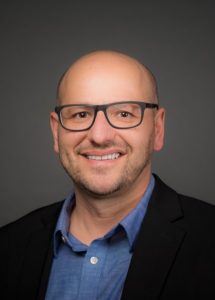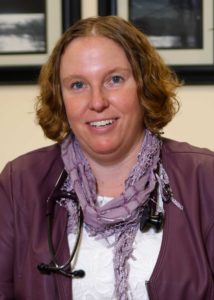For Dr. Kelly Burak, a positive COVID-19 test provided the inspiration to help rural Alberta physicians combat the virus through virtual professional development.
As the Associate Dean of Continuing Medical Education and Professional Development (CME&PD) and the Physician Learning Program (PLP) at the University of Calgary’s Cumming School of Medicine, Dr. Burak knew that video-based distributed learning already played an important part of CME&PD’s current course offerings.
However, it wasn’t until he was at home recovering from a positive COVID-19 diagnosis that he came to an important conclusion: Virtual continuing professional development could become an invaluable tool in the fight against COVID-19 and could be a way to get new information out quickly.
“COVID was such a new entity and the science around it has changed so fast, that there was a real hunger for that knowledge,” said Dr. Burak.

Thanks in part to financial support from RhPAP, the CME&PD’s weekly, Tuesday-morning Rural Virtual Conference Series (RVC) offered through Telehealth reached an average of 91 attendees in 61 rural Alberta communities between September 2019 and March 2020. As cases of coronavirus rose across the province, Dr. Burak recognized that the expertise would be useful for getting rural health professionals the information they needed on COVID.
“[I told my office] this is a very important time for us to step up.”
Luckily, PLP’s previous experience helping physicians using Zoom prior to March 2020 gave them a leg up on the “Zoomdemic.”
“[PLP’s] plan was to bring … together family doctors from across western Canada to Zoom sessions where they could interact with their data,” said Dr. Burak, describing the PLP project as a way to give primary care doctors specific feedback on how they ordered the five most common lab tests.
They used this experience to help successfully transfer CME&PD’s RVC series to Zoom. RVC saw a 70 per cent increase in participation, with an average of 155 people taking part across 98 rural communities.
The COVID Corner series launched in March with the aim of helping physicians stay up-to-date on coronavirus topics, from how to effectively protect themselves with PPE, how to better understand COVID patients and how to manage the virus in the community.
Since the start of COVID Corner, CME&PD has hosted 19 webinars in the series with 100 presenters, panelists, and moderators. As of early December, more than 11,000 participants have already taken part in it. It is an unprecedented attendance number for the CME&PD, representing two-and-a-half times the usual registration numbers they see across all of their 40-50 scheduled conferences per year.
“I personally feel that there’s never been a more important time for continuing professional development than right now.” – Dr. Kelly Burak
Dr. Tracy Burton, a physician at The Associate Clinic and the Pincher Creek Health Centre for the last 12 years, chaired the RVC series, and helped develop topics “that we’re facing in rural medicine with regards to COVID-19.”
Dr. Burton said it was helpful learning from her colleagues in High River who dealt with a large COVID-19 outbreak in April.
“They learned it as they went and so now we can all learn from that,” said Dr. Burton. “I think it really helped us to prepare for it and [also] hope you never need to.”
Dr. Burton said breakout rooms within Zoom, have been another great feature of the series as they allow attendees to go into sessions with different speakers.
“You feel you’re as close to being in the room with them as you can be,” said Dr. Burton.
While Dr. Burton used to have to leave the community for a conference or training, because of Zoom and the new push towards virtual conference learning, she’s now able to attend and learn without leaving her home practice. It has given her the ability to be available if an emergency arises in her community.

“You’re two minutes away from the operating room if you need to be,” said Dr. Burton.
She added that the COVID crisis of 2020 has connected rural doctors more than ever as they bond over shared experiences and questions.
“Sometimes just knowing there’s that many people out there doing the rural medicine thing, I think that helps,” said Dr. Burton, noting other nursing and respiratory therapy staff are joining in the training, too.
COVID Corner has also helped her battle misinformation from sources she’s seen and heard from her patients or elsewhere.
“It’s not like we learned [about COVID] in med[ical] school,” said Dr. Burton. “[Speakers] try to stay really timely with all the topics we’re having. You get those real pearls of wisdom that you can use, and you can implement them right away.”
“It’s just blown my mind,” said Dr. Burak. “We went from a year ago not knowing [anything about] this virus to in the next couple of days [where] people are going to be getting a vaccine … and in January, we’re going to have a rollout of [the] vaccine in this province.”
The increased flexibility for quickly creating and delivering sessions makes it easier for audiences to attend on their own schedules, but Dr. Burak notes that not all is rosy when it comes to Zoom conferences.
“There is Zoom fatigue,” he said. “It’s not the same as being at an in-person conference where you get up and you mingle between sessions.”
With that in mind, CME&PD is limiting multi-day events to half days so medical professionals can keep up to date while fighting the second wave of the COVID pandemic, and managing their usual patients’ ailments.
“You feel you’re as close to being in the room with them as you can be.” – Dr. Tracy Burton.
“I think doctors are busier than ever before,” said Dr. Burak.
But even when social interactions with colleagues can resume at in-person conferences, Dr. Burak stresses that virtual is here to stay.
“We’re figuring out ways of making it more interactive… improving the experience for people in the virtual environment when they can’t be there in person,” said Dr. Burak.
He said he’s seeing physicians with common interests connect across Alberta as they exchange ideas and resources in the chatbox of a Zoom event.
“Communities of practice and coaching are big parts of our plan going forward, and using virtual platforms is going to help us have the greatest reach,” said Dr. Burak.
“I personally feel that there’s never been a more important time for continuing professional development than right now.”
– Britton Ledingham
Emergency Conference goes digital
With the University of Calgary’s Emergency Medicine for Rural Hospitals Conference approaching on January 15-16, 2021, online delivery has presented the opportunity for inviting international speakers to take part.
Dr. Ryan Hoskins, a B.C.-based physician who provides locum coverage in communities across western Canada, including rural Alberta, joined the conference pre-pandemic.
“That’s really [a] fantastic [way] to bring together world opinions,” said the Edmonton native, noting that Dr. Damien Brown, a rural physician from Northern Australia will speak remotely during the online event in January.
Dr. Hoskins has been a participant in online learning as a viewer and deliverer since March. He’s seen a dip in participation between presenters and viewers online versus in-person but has noted a fusion between the audience and presenters in some ways that wasn’t there in-person.
“The online stuff has democratized things a bit more because I think there’s kind of a tendency in a group for people to kind of be listeners or talkers,” Hoskins said during a break between shifts in Hay River, NWT.
The time and cash costs for participants have also been reduced due to going online.
“I’ve accessed some presentations that I probably wouldn’t have gone to before,” Dr. Hoskins remarked.
He encourages others to step into the online teaching role, as he has demonstrated with intubation courses he’s delivered to rural colleagues.
“COVID [has pushed] the health-care system towards the things that people have talked about for a long time before COVID came, but they just weren’t doing,” Dr. Hoskins added.
– Britton Ledingham
